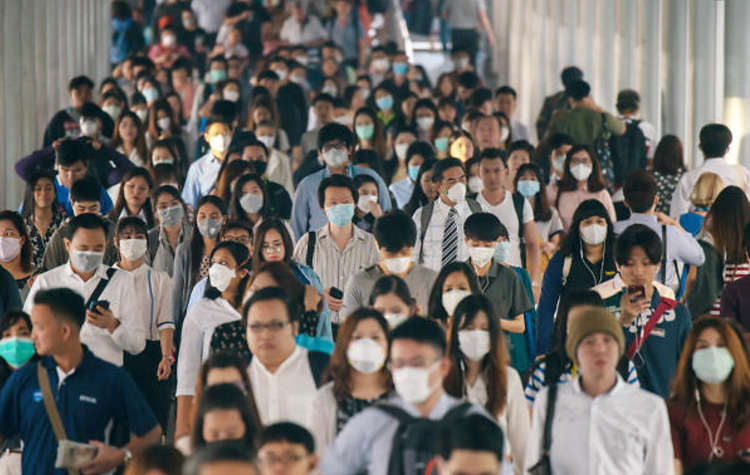*Please scroll down for a Thai version of this statement.
Thailand: COVID-19 emergency decree threatens to stifle fundamental freedoms
(Jakarta, 26 March 2020) – The Asian Forum for Human Rights and Development (FORUM-ASIA) expresses deep concern over the Thai Government’s declaration of a nationwide state of emergency, under which the authorities are granted broad powers and impunity purported to combat COVID-19.
FORUM-ASIA calls on the Thai Government to refrain from implementing disproportionate and unnecessary measures under the emergency decree, which would further erode fundamental freedoms and human rights within an already constricted civic space.
On 25 March 2020, the Thai Government invoked the emergency decree on Public Administration in Emergency Situation, B.E. 2548 (2005). Effective 26 March to 30 April 2020, the emergency decree grants sweeping powers to the Government to impose restrictive measures at the discretion of Prime Minister Prayuth Chan-o-cha. These measures could include restrictions on movement, bans on gatherings and imposed curfews. The emergency decree also grants authorities immunity from any civil, criminal or disciplinary liability when performing their duties.
The overarching provisions stipulated in the emergency decree are vague, and could easily be misused by the authorities to stifle critics of the government. Article 9 (3), which prohibits ‘the presentation, distribution or circulation of news, writings, printed materials or any other media the contents of which are likely to terrify the public’ is particularly concerning. In his announcement on Tuesday, Prime Minister Prayuth Chan-o-cha, warned that those who share ‘distorted news’ will be arrested and prosecuted.[1]
The Thai Government’s use of emergency powers to impose broad restrictions on speech is a clear violation to the freedom of expression. Instead of imposing restrictions on information, the Thai Government should ensure the people’s rights to freedom of expression and free access to information.
Thailand’s dismal record on protecting freedom of expression makes it likely that the emergency decree could be misused to further clamp down free speech. The emergency decree, which has been in force in three southern provinces since 2005, has been linked to human rights abuses. In the past years, Thai authorities have repeatedly used a number of repressive laws such as lese majeste, sedition, criminal defamation, and the Computer Crime Act (CCA) to stifle public dissent.
Most recently, a Thai artist was arrested for his online criticism on the lack of COVID-19 screenings at the main airport in Bangkok.[2] He was later charged for breaching the CCA, and was released on bail. The use of controversial laws and policies as tools for reprisal hampers the enjoyment of fundamental freedoms and human rights in the country.
FORUM-ASIA reiterates the UN Special Rapporteurs’ message that ‘emergency responses to the COVID-19 must be proportionate, necessary and non-discriminatory’, and that these must not be used to quash dissent.[3] A recent petition from civil society organisations in Southeast Asia demand that States ‘abide to international human rights standards and principles when implementing measures to address the COVID-19 pandemic’.[4]
FORUM-ASIA urges the Government of Thailand to ensure policies implemented following the emergency decree comply with international human rights standards. In the measures taken to combat COVID-19, the Thai Government should set concrete limits on the use of power by authorities; put in place accountability mechanisms; and ensure people have full access to reliable information.
FORUM-ASIA further calls on all civil society to remain vigilant, document human rights violations in light of the COVID-19 pandemic, and continue pushing for greater Government transparency and accountability.
**
For a PDF of this statement in English, please click here.
For further information, please contact:
East Asia and ASEAN Programme, FORUM‐ASIA, [email protected]
–
ประเทศไทย: การประกาศสถานการณ์ฉุกเฉินเพื่อจัดการCOVID-19 อาจถูกนำไปใช้เพื่อคุกคามและจำกัดเสรีภาพขั้นพื้นฐาน
(จาการ์ตา – 26 มีนาคม 2020) สภาเพื่อสิทธิมนุษยชนและการพัฒนาแห่งเอเชีย (ฟอรั่ม-เอเชีย) ขอแสดงข้อกังวลอย่างยิ่งต่อมาตรการล่าสุดในการประกาศสถานการณ์ฉุกเฉินที่ผลบังคับทั่วประเทศโดยรัฐบาลไทย ซึ่งเป็นการมอบอำนาจอย่างกว้างขวางและการคุ้มครองให้ไม่ต้องรับผิดแก่เจ้าหน้าที่ที่เกี่ยวข้องในการแก้ไขสถานการณ์การแพร่ระบาดของโรคไวรัสโคโรนา 2019 (COVID-19)
ฟอรั่ม-เอเชียขอเรียกร้องต่อทางรัฐบาลไทยในการออกมาตรการภายใต้สถานการณ์ฉุกเฉินเพียงเท่าที่จำเป็นและเป็นไปตามหลักความได้สัดส่วน เพื่อไม่ให้มาตรการเหล่านั้นส่งผลกระทบเป็นการบ่อนทำลายสิทธิมนุษยชนและเสรีภาพขั้นพื้นภายในพื้นที่ภาคประชาสังคมที่หดตัวอยู่แล้ว
เมื่อวันที่ 25 มีนาคม 2020 รัฐบาลไทยได้ประกาศสถานการณ์ฉุกเฉินตามพระราชกำหนดการบริหารราชการในสถานการณ์ฉุกเฉิน พ.ศ. 2548 (พ.ร.ก.ฉุกเฉินฯ) โดยให้มีผลบังคับทั่วทั้งประเทศนับตั้งแต่วันที่ 26 มีนาคม ถึงวันที่ 30 เมษายน 2020 พ.ร.ก.ฉุกเฉินฯ ดังกล่าวได้มอบอำนาจที่เด็ดขาดมากขึ้นต่อรัฐบาลไทยในการออกมาตรการต่างๆที่จำกัดสิทธิเสรีภาพภายใต้ดุลยพินิจของนายกรัฐมนตรี ประยุทธ์ จันทร์โอชา มาตรการต่างๆเหล่านี้ สามารถออกได้ตามที่กำหนดเอาไว้ภายใต้พ.ร.ก.ฉุกเฉินฯ เช่น ข้อจำกัดในการเดินทางตามพื้นที่ที่กำหนด การห้ามมิให้มีการชุมนุม หรือ การห้ามมิให้บุคคลออกนอกเคหสถานหรือเคอร์ฟิว นอกไปจากนี้ พ.ร.ก.ฉุกเฉินฯ ดังกล่าว ยังกำหนดคุ้มครองให้พนักงานเจ้าหน้าที่ที่กระทำตามมาตรการต่างๆนี้ไม่ต้องมีความรับผิดทั้งทางแพ่ง ทางอาญา หรือ ทางวินัย ยกเว้นแต่เพียงการเรียกค่าเสียหายตามกฎหมายว่าด้วยความรับผิดทางละเมิดของเจ้าหน้าที่เท่านั้น
ข้อกำหนดต่างๆที่ระบุเอาไว้ในพ.ร.ก.ฉุกเฉินฯ ยังมีลักษณะการเขียนที่คลุมเครือ ซึ่งง่ายต่อการถูกนำไปตีความและเอาไปใช้โดยเจ้าหน้าที่เพื่อปิดกั้นการวิพากย์วิจารณ์การทำงานของรัฐบาล หนึ่งในข้อกำหนดที่มีลักษณะน่ากังวลคือมาตรา 9 อนุ 3 ซึ่งระบุ “ห้ามการเสนอข่าว การจําหน่าย หรือทําให้แพร่หลายซึ่ง หนังสือ สิ่งพิมพ์ หรือ สื่ออื่นใดที่มีข้อความอันอาจทําให้ประชาชนเกิดความหวาดกลัว” นอกไปจากนี้ ในระหว่างการแถลงข่าวเมื่อวันอังคาร นายกรัฐมนตรีประยุทธ์ จันทร์โอชา ยังได้กล่าวเตือนถึง การใช้สื่อโซเชียลและการให้ ‘ข่าวสารบิดเบือน’ ว่าอาจถูกจับและดำเนินคดีได้[1]
การออกประกาศสถานการณ์ฉุกเฉินโดยรัฐบาลไทยที่จะออกมาตรการอย่างกว้างในการจำกัดเสรีภาพในการพูดถือเป็นการละเมิดเสรีภาพในการแสดงออกอย่างชัดแจ้ง แทนที่จะออกมาตรการที่จำกัดในเรื่องของข้อมูลข่าวสาร รัฐบาลไทยควรที่จะให้ความคุ้มครองต่อสิทธิเสรีภาพในการแสดงออกและเสรีภาพในการเข้าถึงข้อมูลข่าวสาร
ประวัติอันไม่น่าภิรมย์ของประเทศไทยที่ผ่านมาในการปกป้องเสรีภาพในการแสดงออกทำให้ดูมีความเป็นไปได้อย่างมากที่การประกาศสถานการณ์ฉุกเฉินในระดับชาติจะถูกนำไปใช้เพื่อควบคุมเสรีภาพในการพูด พ.ร.ก.ฉุกเฉินฯเองซึ่งมีการประกาศใช้และขยายอายุมาอย่างต่อเนื่องในสามจังหวัดชายแดนภาคใต้นั้บตั้งแต่ปี 2005 ก็มีส่วนเชื่อมโยงอย่างมากต่อเหตุการณ์ละเมิดสิทธิมนุษยชนที่เกิดขึ้นในพื้นที่ นอกจากนี้ ในช่วงหลายปีที่ผ่านมา ทางการไทยก็ได้มีการใช้ข้อกฎหมายที่มีเนื้อหาเป็นการจำกัดสิทธิเสรีภาพหลายฉบับอย่างต่อเนื่องเพื่อใช้ปิดปากผู้มีความคิดเห็นที่แตกต่างไม่ว่าจะเป็น ประมวลกฎหมายอาญา มาตรา 112 (หมิ่นพระบรมเดชานุภาพ), มาตรา116 (ยุยงปลุกปั่น), มาตรา 326 (หมิ่นประมาททางอาญา), หรือ พระราชบัญญัติว่าด้วยการกระทำความผิดเกี่ยวกับคอมพิวเตอร์ (พ.ร.บ.คอมพิวเตอร์ฯ)
เมื่อไม่นานมานี้ ได้มีการจับกุมศิลปินไทยคนหนึ่งจากการที่เขาโพสต์ข้อความบนโลกออนไลน์ซึ่งกล่าวหาว่าไม่มีเจ้าหน้าที่คัดกรองCOVID-19 ในสนามบินสุวรรณภูมิในช่วงที่เขาบินกลับมาจากต่างประเทศ เขาถูกแจ้งข้อกล่าวหาภายใต้พ.ร.บ.คอมพิวเตอร์ฯ[2] และถูกให้ประกันตัวในภายหลัง[3] กล่าวได้ว่า กฎหมายและนโยบายต่างๆถูกนำไปใช้เป็นเครื่องมือโดยทางการไทยในการระงับไม่ให้ประชาชนสามารถใช้เสรีภาพขั้นพื้นฐานได้อย่างเต็มที่
ฟอรั่ม-เอเชีย ขอกล่าวย้ำถึงข้อกังวลโดยกลุ่มผู้แทนรายงานพิเศษแห่งสหประชาชาติ ที่กล่าวว่า ‘มาตรการฉุกเฉินในการรับมือต่อ COVID-19 จะต้องเป็นไปอย่างได้สัดส่วน เท่าที่จำเป็น และไม่เป็นการเลือกปฏิบัติ’ และมาตรการเหล่านั้นต้องไม่ถูกนำมาใช้เพื่อปราบปรามผู้เห็นต่าง[4] นอกไปจากนี้ ยังมีข้อเรียกร้องจากภาคประชาสังคมต่างๆในเอเชียตะวันออกเฉียงใต้ที่เรียกร้องต่อรัฐสมาชิกในอาเซียนให้นำมาตรฐานและหลักการสิทธิมนุษยชนสากลไปปฏิบัติใช้ต่อมาตรการในการแก้ไขปัญหา COVID-19[5]
ฟอรั่ม-เอเชียขอเรียกร้องต่อรัฐบาลไทยในการทำให้มาตรการหรือนโยบายที่จะออกภายใต้สถานการณ์ฉุกเฉินนี้ เป็นไปอย่างสอดคล้องกับมาตราฐานสากลว่าด้วยสิทธิมนุษยชน โดยการดำเนินการออกมาตรการเพื่อต่อสู้กับโรคระบาด COVID-19 นั้น รัฐบาลไทยควรออกข้อจำกัดอย่างเป็นรูปธรรมต่อการใช้อำนาจของเจ้าหน้าที่ จัดให้มีกลไกต่างๆในเรื่องความรับผิดชอบ และ ทำให้ประชาชนมั่นใจได้ว่าพวกเขาสามารถเข้าถึงข้อมูลข่าวสารที่น่าเชื่อถือได้อย่างเต็มที่
ฟอรั่ม-เอเชียยังขอเรียกร้องต่อภาคประชาสังคมต่างๆให้มีความตื่นตัวและคอยเฝ้าระวัง ตรวจสอบการละเมิดสิทธิมนุษยชนโดยเฉพาะอย่างยิ่งในช่วงการระบาดของ COVID-19 และ ดำเนินงานด้านสิทธิมนุษยชนต่อไปเพื่อเรียกร้องความโปร่งใสและความรับผิดชอบที่มากขึ้นของรัฐบาล
เกี่ยวกับสภาเพื่อสิทธิมนุษยชนและการพัฒนาแห่งเอเชียหรือ ฟอรั่ม-เอเชีย (FORUM-ASIA):
ข้อมูลเพิ่มเติม โปรดติดต่อ East Asia and ASEAN Programme ผ่านอีเมลล์ [email protected]
[1]https://www.bangkokpost.com/thailand/general/1885475/emergency-decree-coming-thursday
[2] https://www.tlhr2014.com/?p=16636&lang=en
[3]https://www.ohchr.org/EN/NewsEvents/Pages/DisplayNews.aspx?NewsID=25722&LangID=E
[4] https://forum-asia.org/?p=31333




